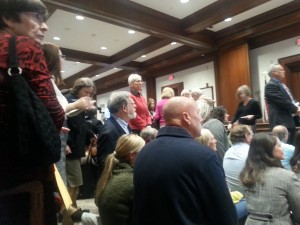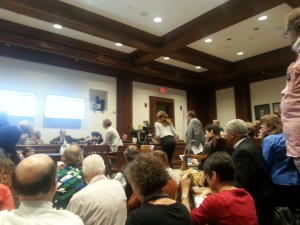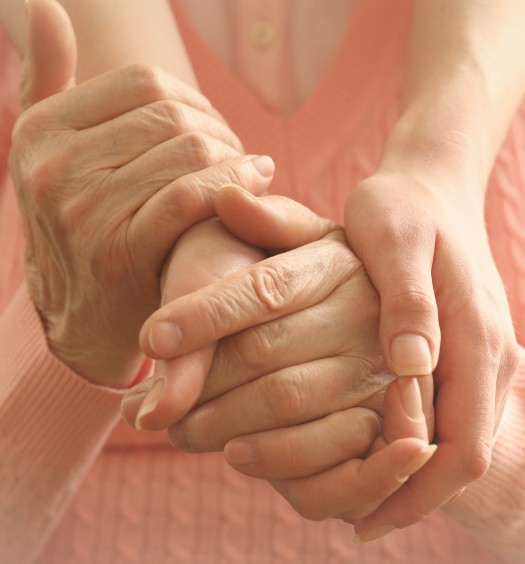Massachusetts Assisted Suicide Hearing Highlights
I want to share my experience from the Massachusetts assisted suicide hearing this past Tuesday for those who could not be present or who had to leave early. I hesitate to take anything for granted, but I think our readers will find it heartening.
I traveled from Hartford to Boston early in the morning. By the time I found parking and made my way to the State House, it was about 11:30. I ended up staying until just before 7:00; although the crowd was thinning, the hearing was still going, two hours past its scheduled end.
And it was a crowd, indeed! If you have ever been to one of the public hearings on assisted suicide at our Capitol and think that was chaotic, you haven’t seen anything. There were so many people trying to get into the hearing room, including many in wheelchairs, that personnel had to ask everyone to clear out so benches could be removed to make room. After that, it was sitting room only.
When it came time to testify, which happened fairly early, I was on a panel that included two members of Second Thoughts Connecticut. (Second Thoughts Massachusetts has similarly lent its support as we battled legislation here.) Stephen Mendelsohn hammered Barbara Coombs Lee’s now-infamous “an issue for another day, but no less compelling” remark and illuminated how expansion of assisted suicide to more and more categories of people, once the door is cracked open, makes perfect sense on legal grounds — anything else is discriminatory. Cathy Ludlum testified that people with disabilities would be “collateral damage.” Both got a mention in The Hartford Courant’s Capitol Watch.
I spoke about a college friend who experienced a suicide in the family and the devastating survivor guilt it induced in him. I was able to tie in statistics from Oregon showing that most people who choose assisted suicide there cite existential concerns rather than fear of uncontrolled pain, plus recent research from Southern Medical Journal concluding that legalization of assisted suicide is associated with a significant rise in overall suicide rates. My testimony got a shout-out from Ellen Kolb at her blog Leaven for the Loaf. I suggest reading that excellent post before going on, as I will reference it. Lest my quote about the Bible scandalize anyone: obviously I am not knocking the Bible or the Judeo-Christian tradition. I simply wanted to respond pointedly to what I’d heard earlier and emphasize the universality of this issue.
Kolb has already mentioned some of the outstanding testimonials, including the indispensable John Kelly of Second Thoughts Massachusetts and impressive newcomer JJ Hanson. I’d like to add these noteworthy others (not an exhaustive list):
Readers may remember law professor Stephen Mikochik from previous Connecticut hearings. Mikochik’s keen mind and expertise simply compelled attention, enhanced by his reclining at ease in the chair and testifying entirely from memory (he is blind). He destroyed the sponsor’s attempts to claim that this sloppily-written bill requires a psychiatric consultation and pointed out, chillingly, that the deadly drugs are soluble in alcohol.
MA Alliance Against Doctor-Prescribed Suicide dramatically presented the “exit bag” used by Derek Humphry’s Final Exit Network. Someone who testified later tried to paint them as liars. Yes, today’s “Compassion & Choices” has splintered from Hemlock Society founder Humphry, but it’s worth noting that there’s this entity that thinks C&C doesn’t go far enough.
The vice president of the Massachusetts Medical Society told the committee how his mother was diagnosed with inoperable lung cancer and the literature stated that she had at most 9 months to live. She was treated, but as we all do, eventually died — ten years later.
Carrie Houlard, mother of Bobby, said that “we cannot be complicit in decisions based on fear” and “I’ve heard no condition today that a disabled child hasn’t gone through.” She made the first reference I heard to medical marijuana, and asked what would happen if a child got ahold of the lethal drugs.
Rev. Rivers, an African-American pastor who I saw emphatically nodding his head at several points, was outstanding, making his case with serious rhetorical flair. What brought him there, he said, was not “religious conviction, sentiment, or dogma,” but the need to speak to the “disproportionate impact on populations that have not been mentioned by any advocate…those who, as a function of inequality and poverty, have no choice and are marginalized by the medical system.” Way to address the elephant in the room!
Meghan Schrader, whom I have mentioned here before, was poised and scholarly as she spoke about systemic ableism and her experience with individuals in foster care who do not have loving families to advocate for them and would be at the whim of volunteers.
From our sister organization, Massachusetts Family Institute, Andrew Beckwith and Jonathan Alexandre testified against the bill.
Not present, but submitting written testimony against the bill was State Senator Ted Kennedy, Jr.
On the other side, a panel of three doctors may not have helped their cause. I listened to this trio make astonishing claims that “false hope” is more harmful than killing and that there is some sort of contradiction in supporting medical assistance in giving birth, but not doctors prescribing death as a treatment. I certainly was scratching my head. One said he felt “impotent” when he couldn’t help patients kill themselves. A committee member asked if they were comfortable with the language about psychiatric counseling, and one responded (I paraphrase) that he would have felt that was unnecessary because he just knew his patients that well. They flat-out admitted that “this is a bill that ends up affecting the most educated…upper-income people. …They’re not depressed people.” Money does buy happiness! Who knew? Finally, one invoked the justice system, which sometimes sends innocent people to jail while guilty criminals get off. “Doctors are human…we’re not going to get it perfect, but we’ll get close.” Cathy Ludlum is absolutely right: these proponents are comfortable with collateral damage; it’s not their problem. I hope these guys testify every time!
The committee member Kolb mentions, who asked excellent, piercing questions such as the one that elicited that embarrassing double-standard from the National Association of Social Workers, was Rep. Jim Lyons. For my part, I felt we may have already won just a few hours in when a C&C supporter complained aloud that someone other than Rep. Lyons should speak up and that the committee members should each state their opinions. When Sen. Ross clarified that the point of the hearing was to hear public input, and Sen. Lewis added that the members could ask questions or not at their own discretion, the individual said, “It’s just one-sided.” Well, that’s what happens when one side turns out more people with more passion. My impression was that this was a virtual shutout in favor of life and true compassion. Let’s hope the committee respects the voice of the people.



















